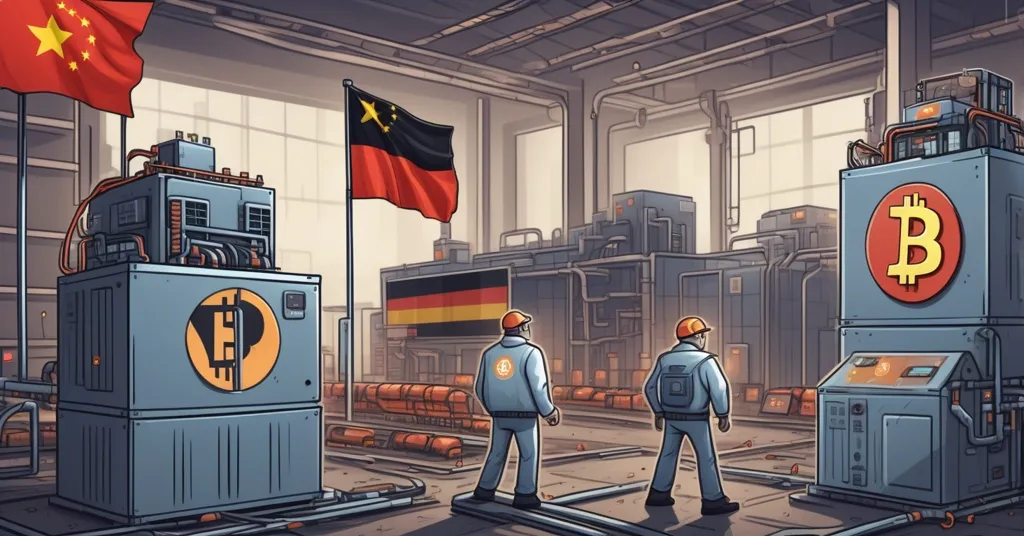Germany-China Trade Clash Threatens Bitcoin Mining Hardware Supply

Germany-China Trade Tensions: Impact on Rare Earths, Semiconductors, and Bitcoin Mining Hardware
Germany’s trade relationship with China has taken a sharp turn for the worse, and the fallout could send shockwaves through the crypto world. The postponement of a critical diplomatic visit over China’s export controls on rare earths and semiconductors—materials essential for tech and blockchain hardware—has exposed deep vulnerabilities in global supply chains. For Bitcoin miners and decentralized tech enthusiasts, this isn’t just geopolitics; it’s a direct threat to the tools that power our revolution.
- Diplomatic Stumble: German Foreign Minister Johann David Wadephul postponed a Beijing trip on October 24 after China greenlit only one of several planned meetings.
- Critical Stakes: The visit was meant to tackle China’s restrictions on rare earths and semiconductors, key components for Bitcoin mining rigs and tech infrastructure.
- Strategic Overhaul: German officials are now urging a rethink of trade reliance on China, with ripple effects for global crypto hardware markets.
Diplomatic Deadlock: Germany’s China Challenge
The saga kicked off when Johann David Wadephul, a prominent figure in Germany’s Christian Democratic Union (CDU) and a key voice on foreign policy, shelved his planned trip to Beijing on October 24. His mission was to confront China’s tight export controls on rare earths—a set of 17 obscure metals vital for high-tech manufacturing, from electric vehicle batteries to the magnets in computing hardware—and semiconductors, the tiny chips that power everything from smartphones to specialized Bitcoin mining equipment. When Beijing confirmed just one meeting out of several requested, Wadephul pulled the plug, rescheduling for October 26 with a clear message about the need for equitable trade practices. As he stated:
“Fair trade is crucial for successful relations.” – Johann David Wadephul
Germany, the economic powerhouse of Europe, is caught in a bind. China isn’t just a trade partner; it’s the biggest, fueling German industry with critical materials. The numbers are staggering—China accounts for over 60% of global rare earth production and dominates semiconductor supply chains. Berlin’s 2023 China Strategy paints China as a partner, competitor, and systemic rival all at once, pushing to lessen economic dependence while still keeping trade lines open. But this diplomatic snub screams bigger problems than a missed meeting. It’s a stark warning of how fragile these ties have become, as highlighted by recent calls for Germany to rethink its trade strategy with China.
Voices in Germany aren’t holding back. Adis Ahmetovic, a foreign policy representative from the Social Democrats, called the cancellation a troubling signal for bilateral relations, pushing for a bold reassessment:
“We must reconsider Germany’s strategy toward China. Now more than ever, we need an active and strategic foreign policy emphasizing dialogue, transparency, and long-term goals.” – Adis Ahmetovic
Jürgen Hardt, another CDU foreign policy expert, echoed this frustration, slamming China’s approach as economic coercion rather than cooperation. Under Chancellor Friedrich Merz’s leadership, there’s mounting pressure to diversify supply sources or ramp up domestic production. Let’s be real, though: Germany’s been coasting on cheap Chinese imports for too long, ignoring the ticking time bomb of dependency. Pivoting away from China isn’t a quick fix—it’s a grueling, costly slog that could take a decade with no sure payoff. Analysts point to past EU efforts, like the 2010 rare earth initiatives, which stumbled due to high costs and technical hurdles.
Why Rare Earths and Semiconductors Matter to Crypto
For those of us in the crypto space, these trade tensions aren’t abstract policy debates—they hit right at the heart of our operations. Bitcoin mining, along with other proof-of-work (PoW) networks, is a hardware-hungry beast. Whether it’s GPUs (graphics processing units, versatile chips used for altcoin mining) or ASICs (Application-Specific Integrated Circuits, custom machines built solely for mining Bitcoin with unmatched efficiency), these devices rely heavily on semiconductors and rare earth components. China’s export curbs can strangle the supply of these parts, spiking costs or halting production altogether.
Cast your mind back to the 2021 GPU shortage—a brutal perfect storm of supply chain chaos and crypto price booms. Prices for graphics cards soared over 200% in some markets, leaving small-scale miners scrambling or priced out entirely. We could be on the brink of a similar crisis if Germany-China relations sour further. Beyond Bitcoin, the broader blockchain ecosystem—think node infrastructure for decentralized networks or servers powering DeFi platforms—depends on reliable tech hardware. Germany, a key hub for European tech innovation, struggling to secure these materials could mean delays in blockchain scalability and mainstream adoption across the continent.
Even altcoins face unique risks. While Bitcoin mining leans on ASICs, GPU-dependent networks like Ethereum Classic or Ravencoin could see different supply challenges, as GPUs are more versatile and contested across gaming and AI industries too. Bitcoin maximalists might shrug at altcoin woes, but let’s not pretend these niches don’t matter—they often test innovations that Bitcoin itself can’t or won’t tackle. The bottom line? Bitcoin mining supply chain disruptions could drive up crypto hardware costs, squeezing out smaller players and threatening the decentralized ethos we hold dear.
Playing Devil’s Advocate: China’s Perspective
Before we pile all the blame on Beijing, let’s flip the script. China’s export controls aren’t just petty bullying—they’re a calculated move in a cutthroat global game. Rare earths are a finite resource, and with China controlling the lion’s share of production, why should they give up their leverage without a hefty return? Semiconductors, too, are a strategic asset in a world where tech dominance equals power. Look at the U.S. slapping export bans on Chinese firms like Huawei over national security fears—China’s playing the same hardball, just with different cards.
Historically, China’s been burned by unequal trade deals, and today’s policies reflect a drive to secure their economic future. Should they be faulted for prioritizing national interest over Germany’s convenience? Probably not. And let’s not paint Germany as a saint here. Berlin’s enjoyed decades of cheap Chinese resources, building its industrial might on a shaky foundation of over-reliance. This diplomatic spat might just be the rude awakening Europe needs to get serious about self-reliance. Could the crypto community seize this chaos as a chance to innovate? Decentralized supply chain tracking on blockchain tech, for instance, might help unearth alternative sources for these materials, cutting through the geopolitical muck with transparency and trustlessness.
Risks to Bitcoin’s Decentralized Ethos
Let’s not sugarcoat the immediate risks. If semiconductors and rare earths become scarcer or pricier due to these trade barriers, mining rigs could turn into luxury goods overnight. Small-time miners—often the backbone of Bitcoin’s decentralized network—might get pushed out, unable to afford the gear. As of 2023, over 50% of Bitcoin’s hashrate (the total computational power securing the network) is already controlled by just a handful of major mining pools, per Blockchain.com data. Further centralization from hardware scarcity would only worsen this, concentrating power in the hands of well-funded giants and undermining the very freedom and privacy Bitcoin stands for.
There’s an environmental twist to this mess too. Rare earth mining is notoriously messy, involving toxic chemicals and massive land disruption. If Germany or other nations scramble to source these materials elsewhere to dodge China’s grip, we might just be swapping one ecological disaster for another. This piles onto the ongoing critique of Bitcoin’s energy footprint—ironic, isn’t it, that the tech promising financial sovereignty could be tethered to some of the dirtiest supply chains on the planet? It’s almost laughable, like learning your cutting-edge Bitcoin mining rig secretly runs on something as whimsical as glitter.
Can Blockchain Tech Offer Solutions?
Amid the gloom, there’s a glimmer of hope rooted in the tech we champion. Blockchain-based supply chain solutions could be a game-changer for navigating these vulnerabilities. Platforms like IBM’s Food Trust or VeChain already use distributed ledgers to track goods with transparency—imagine adapting this to monitor rare earths or semiconductor sourcing. Decentralized, trustless systems could verify origins and availability, helping industries (and miners) dodge over-reliance on single suppliers like China. Scaling such tech to handle global trade complexities is untested, but isn’t that the next frontier for DeFi and blockchain innovators?
Taking an effective accelerationist (e/acc) stance, this crisis could turbocharge innovation in decentralized hardware solutions. Open-source mining tech or alternative manufacturing hubs might emerge if trade pressures keep mounting. Countries like Canada or Australia, sitting on untapped rare earth deposits (Australia produces about 15% globally compared to China’s 60%), could step up as suppliers, potentially stabilizing crypto hardware markets. It’s speculative, sure, but disruption often births progress—and as crypto enthusiasts, we thrive on shaking up broken systems.
What’s Next for Trade and Tech?
Wadephul’s rescheduled trip on October 26 looms as a critical test. Will China ease its export controls, or dig in deeper? Can Germany chart a course that safeguards its economy without burning bridges with its largest trade partner? Broader trends—like EU policies on critical materials or escalating U.S.-China tech wars—frame this as more than a bilateral spat; it’s a snapshot of a fracturing global order. For the crypto community, the stakes couldn’t be higher. Hardware isn’t just gear—it’s the gateway to decentralization, privacy, and financial sovereignty, the core of what Bitcoin and blockchain represent.
If supply chains buckle under geopolitical strain, the democratizing promise of this tech could falter. Pricey or scarce mining equipment might lock out the little guy, while delays in blockchain hardware slow the march toward mainstream adoption. Yet, if dialogue prevails over deadlock, and if decentralized solutions rise to the challenge, we might emerge stronger. Germany’s next moves, and China’s response, aren’t just headlines for economists—they matter to every miner, node operator, and HODLer fighting for a freer financial future.
Key Questions for Crypto Enthusiasts
- How do China’s export controls on rare earths and semiconductors affect Bitcoin mining?
These restrictions can choke the supply of components for ASICs and GPUs, driving up crypto hardware costs and making mining less accessible to smaller operators. - Could Germany’s trade strategy shift impact blockchain technology development?
Diversifying supply chains might spark innovation in blockchain hardware, but short-term disruptions could stall progress in decentralized tech across Europe. - Can blockchain solutions mitigate supply chain risks from these trade tensions?
Yes, decentralized tracking on platforms like VeChain could ensure transparency in sourcing critical materials, reducing dependency on single suppliers—though scaling remains a challenge worth tackling. - What’s the risk of escalating trade tensions on crypto hardware accessibility?
Higher costs or scarcity of parts could price out small miners, consolidating Bitcoin’s hashrate with larger players and challenging the network’s decentralized nature. - Why does fair trade matter for the crypto tech ecosystem?
Fair trade prevents monopolistic control over essential materials, ensuring stable pricing and access for hardware that powers decentralized networks, keeping the space open to all.



